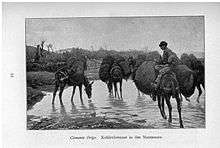Clemente Origo
Biography
He was a resident of Florence. His subjects commonly display cattle and horses and scenes of herding in the Italian lowlands. he also painted landscapes, often exhibiting at the Promotrice of Florence and other Italian exhibitions. Among his works are Testa dì cavallo, studio dal vero; Cavalli al trotto; Mandria al pascolo; Strada di Larici, studio dal vero,[2] Cavallino caduto (1902, Uffizi), Morte del cervo (1907), and plans for the Monument to Alexander III at St Petersburg, Russia. Origo had studied design briefly with Cesare Fracassini and with Guglielmo de Sanctis. He later dedicated himself to sculpture, working with P. Trubeckoj.[3]
gollark: Cobwebs are not capable of computation within the brain.
gollark: ddg! おまえ
gollark: Also, COVID-19 means that's somewhat limited.
gollark: "Go[ing] to any country" is quite expensive, and airport "security" (really, it's pointless security theater) would *probably* complain if I went through alone after somehow buying tickets.
gollark: I can't just "go to any country".
References
- Clemente Origo at Treccani Encyclopedia
- Dizionario degli Artisti Italiani Viventi: pittori, scultori, e Architetti., by Angelo de Gubernatis. Tipe dei Successori Le Monnier, 1889, page 337.
- Treccani encyclopedia
This article is issued from Wikipedia. The text is licensed under Creative Commons - Attribution - Sharealike. Additional terms may apply for the media files.
